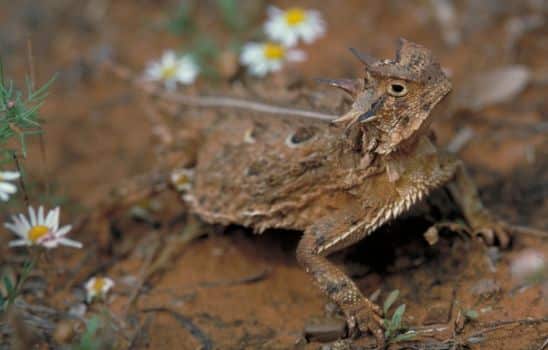Description:
Popularly called ‘horned toads’ due to their squat appearance, these unusual members of the iguana family occupy a special ecological niche. Their flat, mottled shape makes them very cryptic against sand and gravel as their numerous spines break up the outline of their bodies. The spines are also useful for repelling the mouths of predators, particularly when they puff full of air to make themselves larger. Texas horned lizards eat small insects, primarily ants. This diet is difficult for most keepers to reproduce for their charges in captivity; one lizard may eat thousands of ants per day! This obstacle has kept them from becoming mainstays in the pet trade, although recently well-acclimated captive-bred offspring are showing promise for faring better. Water is obtained mostly from dew and rain drops lapped off plants and their own bodies. The best set-up in a vivarium would be an open ground environment with minimal cage furniture. A basking lamp should let one end of the enclosure get over 100 degrees Fahrenheit so they can thermoregulate under it and keep their temperature where they want it to be all day. Texas horned lizards are strictly day-active on the surface and do not require limbs to climb. Keep handling down until newly acquired pets have thoroughly become accustomed to life in your cage.
Habitat:
Open grasslands and semi-desert areas
Range:
South-central U.S. and into Mexico
Scientific Name: Phrynosoma cornutum
Species Group:
Family: Iguanidae
Size: 3 to 5 inches
Level: advanced
Weight:
Dangerous: No



